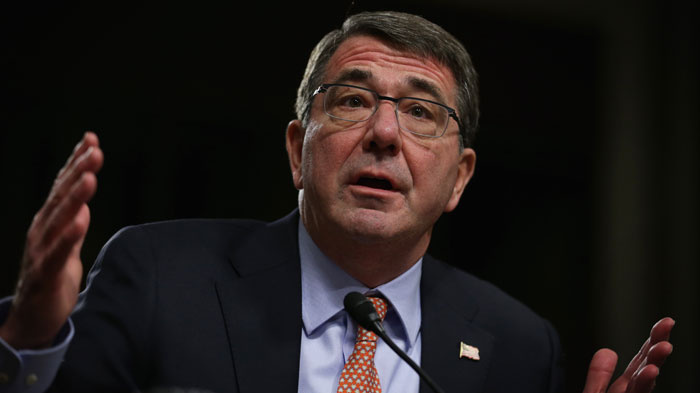Senate Confirms Ashton Carter as Defense Secretary

Carter’s first day at the Pentagon will be Tuesday, according to an official associated with the confirmation.
It’s been widely assumed Carter would face an easy confirmation since President Barack Obama announced his nomination in early December. Carter is viewed as a smart choice to run the Pentagon, having previously served as the deputy defense secretary and the military’s top weapons buyer. His nomination was unanimously confirmed by the Senate Armed Services Committee earlier this week.
“Ash Carter served as a key leader of our national security team in the first years of my presidency, and with his overwhelming bipartisan confirmation by the Senate today, I’m proud to welcome him back as our next Secretary of Defense,” President Barack Obama said in a statement.
Carter left his post as deputy just over a year ago, but his Feb. 4 confirmation hearing highlighted just how much has changed in the world of national security since he left. Lawmakers wanted to know whether he supported sending weapons to Ukrainian forces fighting Russia-backed separatists, something Carter said he was inclined to support. Questions about the Obama administration’s strategy to defeat the Islamic State also dominated the hearing, with Republican senators voicing skepticism about the current plan.
Carter said his top priority upon arriving at the Pentagon will be to travel to Iraq to discuss the strategy with U.S. military leaders there.
The U.S. troop withdrawal from Afghanistan is another topic that will be demanding Carter’s attention upon his arrival at the Pentagon.
Army Gen. John Campbell, the top U.S. commander in Afghanistan, told lawmakers Thursday morning he had presented Obama options to keep American troops in Afghanistan past the December 2016 deadline the White House has set.
Campbell told the Senate Armed Services Committee his recommendations provided the White House with “flexibility.” Campbell said that while he is comfortable with the president’s current plans, the options he presented provide an alternate timeline for troops to leave.
“The next two years of the campaign will play a crucial role in cementing our gains,” the Army four-star general said. “As in the past, our drawdown will occur under enemy pressure. We will need to manage to our efforts to maximize the effects of our [tactical air controllers] and our continued consolidation toward a Kabul-centric posture in 2016.”
Sen. John McCain, the Republican chair of the committee, said that given the Taliban’s recent surge in violence and Afghanistan’s fragile government, the “current troop drawdown plan for Afghanistan no longer accurately reflects the facts and conditions on the ground.”
In addition to tackling today’s urgent security and policy questions, Carter is also expected to make Pentagon acquisition reform a top priority. He’s said he wants to push the Defense Department to move faster, developing and building technology at a quicker pace and for fewer dollars. A big part of this will be trying to attract commercial companies, particularly high-tech startups in places like Silicon Valley, to help solve some of the military’s most vexing technology problems.
When not serving in government, Carter has spent much of his career in the academic world, teaching at Harvard University’s John F. Kennedy School of Government. He earned bachelor’s degrees in physics and in medieval history from Yale University, and a doctorate in theoretical physics from Oxford University, where he was a Rhodes Scholar.
Source: FP

